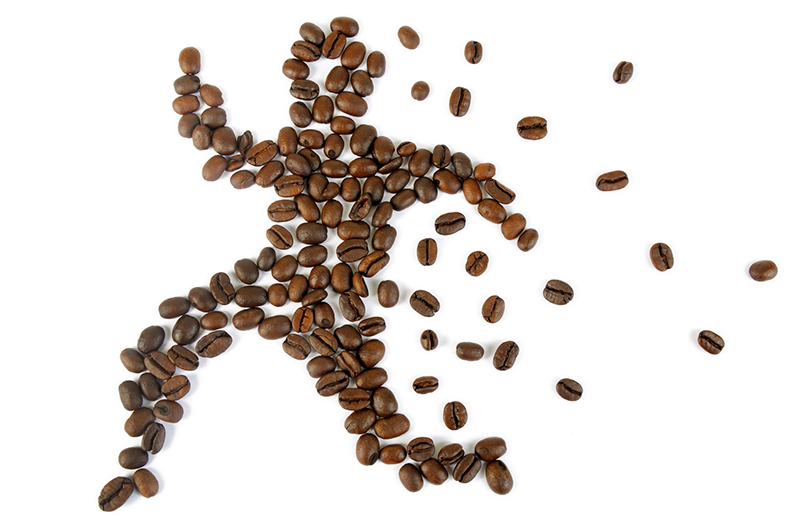Studies have shown that caffeine can benefit endurance performance, high-intensity exercise, and power sports. In addition to coffee as a source of caffeine, more and more caffeinated drinks and pre-workout supplements are appearing on the shelves and marketed towards people looking to improve performance. Almost 1/3 of young adult consume these pre-workout supplement on a regular basis1. But do they really work?
Caffeine and general health
The long and short (black with a dash of milk) of it is that your daily coffee (or coffees) is probably not doing any physical harm. In fact, moderate consumers of coffee have a greater life expectancy than those who don’t drink it. Caffeine is by no means a substitute for sleep on a regular basis, but there’s no reason to cancel your Nespresso subscription if you need it for the occasional pick-me-up!
Remember, though that caffeine is a drug and it is addictive. Excessive caffeine can be associated with some negative side effects including headaches, increased heart rate, tremors/shakes, and gastrointestinal distress. Regular consumption has been linked to changes in brain functioning. Yes, caffeine withdrawal is an officially recognised mental disorder.
Effect on performance
Weight Loss & Weight Management
There is scarce published research on the role of caffeine in weight loss and weight management. And from the studies that have been conducted, results have been conflicting. There have been some promising early finds of caffeine, when taken in combination with ephedrine, increasing weight loss, fat loss, and decreasing waist circumference2. Contrary to popular belief though, it is unlikely that caffeine increases fat use to spare glycogen during exercise3.
2. Aerobic Exercise
A recent review and meta-analysis found that the evidence for the performance benefits to be stronger for predominantly aerobic tasks than for anaerobic4. It is believed that the main performance benefits come from caffeine’s influence on the central nervous system where it inhibits actions at adenoside receptor sites5,6. This reduces our perception of pain and effort, so exercise feels easier, improving endurance performance. how hard we feel we’re working and how fatigued we are so that exercise feels easier.
3. Anaerobic Exercise
There is some performance enhancement in anaerobic tasks, albeit not to the same extent as seen in aerobic performance4. Martinez>sup>7 showed significantly higher anaerobic peak power output and average power output during a 30s Wingate anaerobic test following caffeinated pre-workout supplementation. The jury is still out regarding the effects of caffeine on strength and power performance8 but a literature review last year9 found there seems to be some positive impact on maximal strength, time to fatigue, exercise volume, and reduced pain and force drop off. A study out of the UK earlier this year10 demonstrated a positive impact on maximal strength from low caffeine doses (100mg) in physically active females who were habitual coffee drinkers. Similarly, Grgic et al11 found enhanced lower body strength in men who consumed a small dose of caffeine (2mg/kg body mass) compared to those who received no caffeine or those who had higher doses, upper body strength also increased with caffeine supplementation in a linear dose-response relationship.

Recommendations
Much of the earlier research that demonstrated caffeine’s performance-enhancing effects used moderate to high doses (5-9mg/kg body mass). More recent research indicates doses ranging from 1-3mg per kg of body weight (~70-150mg) are sufficient to improve performance when taken before exercises with no further performance enhancement when consumed in higher doses8. Stimulatory effects usually peak within 30-75mins after ingestion so you would ideally you’re your intake to get the full benefit during your desired performance. Individual responses do vary.
If using caffeine to enhance your performance, unfortunately this is where you’ll have to lower your Keep Cup and find an alternate source. The majority of the research into caffeine as an ergogenic aid uses “caffeine anhydrous”, a highly concentrated caffeine powder. A smaller group of studies used caffeinated energy drinks, gels, bars, etc. But Coffee as an effective source of caffeine is relatively unchartered territory in the literature4. The amount of caffeine in a typical coffee varies widely and is not a reliable measure. Coffee is likely to be effective, as a study where the amount of caffeine was matched to caffeine anhydrous was similarly effective in enhancing aerobic endurance performance12 and lower body strength13. To be ergogenic the amount of caffeine needs to be around that 3mg/kg range. A standard cup of coffee contains ~100mg (although this varies widely and is not a reliable measure) so 2 cups of coffee consumed an hour before exercise should aid performance, but keep in mind that could be quite a volume for some people to tolerate.
Keep your caffeine consumption moderate and that daily coffee can still be a part of your balanced nutrition plan.
